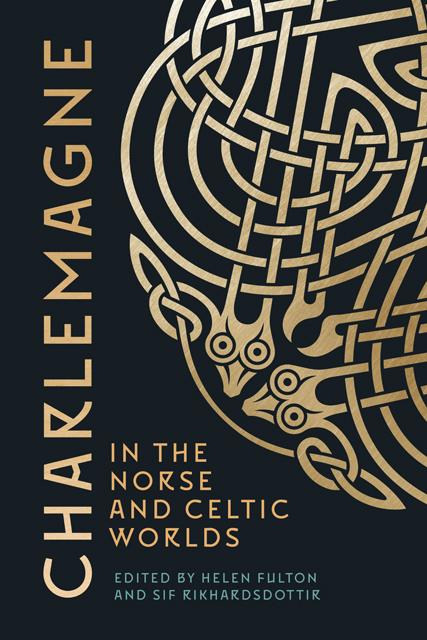Book contents
- Frontmatter
- Contents
- List of Maps and Figures
- List of Contributors
- General Preface: Charlemagne: A European Icon
- Acknowledgements
- Map
- Introduction: Transmission of Charlemagne in Scandinavia, Wales, and Ireland
- Part I The Norse Charlemagne
- Part II The Celtic Charlemagne
- Bibliography
- Index
- Bristol Studies in Medieval Cultures
3 - The Norse Roland in Context
Published online by Cambridge University Press: 08 June 2023
- Frontmatter
- Contents
- List of Maps and Figures
- List of Contributors
- General Preface: Charlemagne: A European Icon
- Acknowledgements
- Map
- Introduction: Transmission of Charlemagne in Scandinavia, Wales, and Ireland
- Part I The Norse Charlemagne
- Part II The Celtic Charlemagne
- Bibliography
- Index
- Bristol Studies in Medieval Cultures
Summary
This chapter situates the translation process and reception of the Charlemagne material in the North in a more specific context by focusing on the Norse representation of a single figure: that of Roland, the most renowned of all of Charlemagne’s warriors. It is intended as a case study to articulate in detail the larger conceptual frameworks of transmission, adaptation, and reception of the Charlemagne material explored in the previous and subsequent chapters by focusing on the representation of the well-known Chanson de Roland in the large compilation of the chronicles of Charlemagne, Karlamagnús saga. In the Norse text, Roland’s heroic death is recounted within the narrative context of the saga of Charlemagne, indicating the perceptual framework medieval Nordic audiences had of the legendary material as a royal biography or an epic tale in the manner of the Icelandic sagas. The material of the Chanson forms the eighth þáttr (branch) of the compilation entitled Af Rúnzivals bardaga (‘Of the Battle at Roncevaux’), often referred to as Rúnzivals þáttr (‘the Roncevaux Episode’). The chapter presents an analysis of the function of the story of Roland within the narrative framework of Karlamagnús saga as well as an overview of the process of transmission and potential source materials. Finally, the chapter reveals the cultural adaptation of the figure of Roland in terms of his socio-political, behavioural, and literary function within the Nordic reading community.
The Long and Short of the Norse Roland
We do not know whether the story of Roland was translated independently or whether it formed a part of the compilation from the beginning. As with Þiðreks saga af Bern – another Old Norse compilation featuring a legendary king, Theodoric of Bern – there is no evidence to prove (or disprove, for that matter) the existence of individual branches or stories, although scholars tend to lean towards the compilation having come about in stages. The Old Norse Rúnzivals þáttr is based on a version of the Roland material that is quite close to the well-known Oxford version of Chanson de Roland, although the Digby manuscript was not the direct source.
- Type
- Chapter
- Information
- Charlemagne in the Norse and Celtic Worlds , pp. 50 - 65Publisher: Boydell & BrewerPrint publication year: 2022



